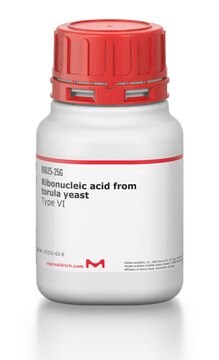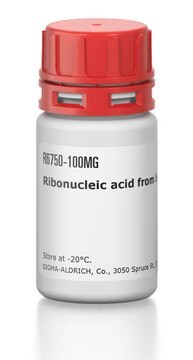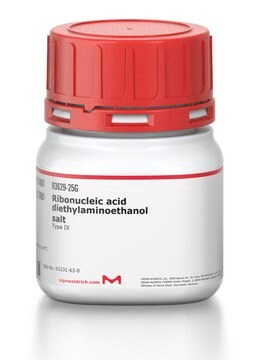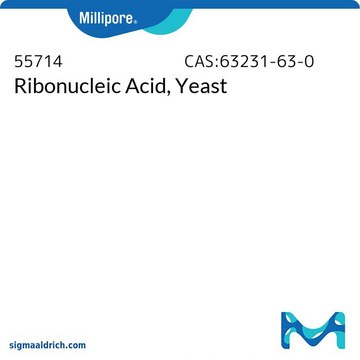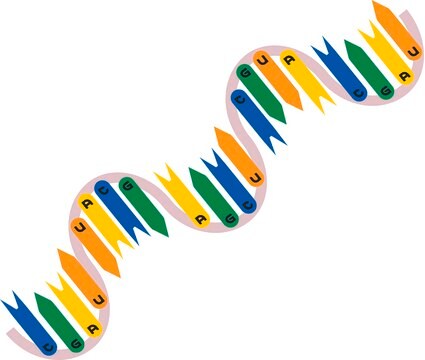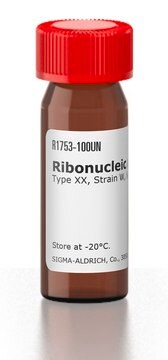R6875
Ribonucleic acid from torula yeast
core, Type II-C
Synonym(s):
RNA
Sign Into View Organizational & Contract Pricing
All Photos(1)
About This Item
Recommended Products
Looking for similar products? Visit Product Comparison Guide
Application
Ribonucleic acid (RNA) from torula yeast may be used as a substrate for studying ribonuclease activities of enzymes such as ribonuclease-A, ribonuclease T1 (RNAase) and bougainvillea xbuttiana antiviral protein 1 (BBAP1).
Storage Class Code
11 - Combustible Solids
WGK
WGK 3
Flash Point(F)
Not applicable
Flash Point(C)
Not applicable
Personal Protective Equipment
dust mask type N95 (US), Eyeshields, Gloves
Choose from one of the most recent versions:
Already Own This Product?
Find documentation for the products that you have recently purchased in the Document Library.
Customers Also Viewed
Ribonuclease, deoxyribonuclease, and antiviral activity of Escherichia coli-expressed Bougainvillea xbuttiana antiviral protein 1.
Choudhary NL, Yadav OP, Lodha ML.
Biochemistry. Biokhimiia, 73, 173-177 (2008)
J Steyaert et al.
Biochemistry, 30(35), 8661-8665 (1991-09-03)
We report on the effect of the viscogenic agents glycerol and ficoll on the RNase T1 catalyzed turnover of GpA, GpC, GpU, and Torula yeast RNA. For wild-type enzyme, we find that the kcat/Km values for the transesterification of GpC
H Yanagawa et al.
Nucleic acids symposium series, 25(25), 113-114 (1991-01-01)
Three nucleosides catalyzing the oxidoreduction of NADH and K3Fe(CN)6 were isolated from Torula yeast RNA and also obtained by a series of steps: SDS-phenol extraction, nuclease P1 digestion, alkaline phosphatase digestion, anion exchange chromatography, and HPLC on an ODS column.
Toru Miyamoto et al.
Biotechnology progress, 25(6), 1678-1685 (2009-09-03)
Ribonuclease (RNase), which often represents molecular biological contamination, is a thermostable enzyme. When RNase is heated at 121 degrees C by autoclave sterilization for 20 min, it does not lose its activity. However, the nature of the molecular events by
Abstracts of Albany 2013: the 18th Conversation. June 11-18, 2013. Albany, New York, USA.
Journal of biomolecular structure & dynamics, 31 Suppl 1, 1-139 (2013-06-06)
Our team of scientists has experience in all areas of research including Life Science, Material Science, Chemical Synthesis, Chromatography, Analytical and many others.
Contact Technical Service